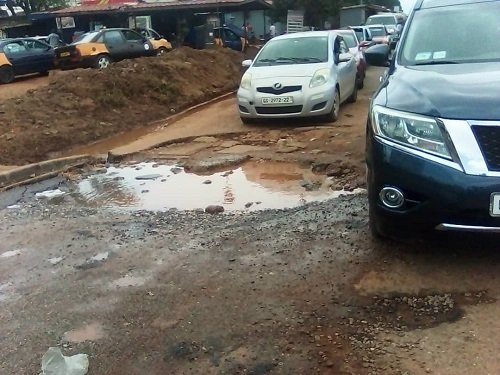Editorial
Repair the gaping pot holes at Ritz junction

One of the gaping pot holes near the Ritz jumction traffic liight
There is a deep concern among residents along the border between Adentan Municipal Assembly and La-Nkwantanang Madina Municipal Assembly, especially those living within Ritz traffic light (Ritz junction) area.
The inhabitants’ worry is about gaping pot holes on the road located near the traffic signal pole on the Ashalley Botwe-Ritz junction side of the road.
For years, these yawning pot holes on this busy road had created unbearable heavy traffic for motorists and passengers who ply the route.
What makes the situation scary is that, impatient motorists at top speed and in a bid to avoid the pot holes to beat the red light, swerve towards the median of the road (made of concrete) or towards the right side of the road, where pedestrians walk.
This dangerous driving had seen some of the impatient motorists either crashing into the concrete slab or scratching it and denting their vehicles in the process, while others who veered towards the pedestrians, either hit them or missed them by a hair’s breadth.
Some motorists who pass through the pot hole in haste either end up destroying the ball joint of their vehicles or their vehicles’ exhaust pipe mufflers, or burst the tyres of their vehicles, among others.
With the road on the border between these two assemblies, whose lackadaisical attitude towards the situation is unacceptable, it is becoming evident that unless the Ministry of Roads and Highways steps in, the assemblies would not respond to remedy the situation.
A stitch in time saves nine.
Kwabena Mensah Ofori,
Adenta East, Accra
Editorial
Promote welfare of African children
The African Union hosts the annual International Day of the African Child on June 16 to increase awareness of the rights and ongoing struggles of African children.
Additionally, the day offers a forum for talking about and addressing topics including healthcare, education, and safety from exploitation and abuse.
It began in 1976 when students in Soweto, South Africa, were killed for demonstrating against inequality and injustice in education.
Since children have rights that must be upheld, the African Day celebration is appropriate because it serves as a poignant reminder to our communities to put children’s needs first, ensuring that they develop and realise their full potential.
Most importantly, it pushes people, governments, and communities to address pressing issues like child labour, inadequate education, and to ensure safe, healthy environments.
This year’s theme, “Planning and budgeting for children’s rights: progress since 2010,” is no exception to the efforts done thus far by governments, individuals, parents, and others to advance the welfare of children.
In addition to their rights to nutritious food, medical care, secure housing, and high-quality education, children also require emotional support, safety, and protection from danger in order to flourish.
Children’s physical, mental, and social development depends on these necessities, yet far too many continue to be denied their rights and go without food, housing, water, or health care.
While eating, sleeping, playing, and learning are all important aspects of a child’s growth, some children do not find these activities enjoyable. Such children work independently to make ends meet although their parents are responsible for that role,
Many people and organisations have put a lot of effort into making sure that children’s rights are outlined, upheld, and safeguarded; thus, everyone must keep fighting for children’s rights.
The Convention on the Rights of a Child (CRC) was created in 1989 as a result of the Universal Declaration of Human Rights, which served as the foundation for all legal norms pertaining to children’s rights. This is the first international agreement with legal force that covers all human rights.
Therefore, a multifaceted strategy encompassing legal frameworks, education, community involvement, and tackling systemic challenges is needed to assure the preservation of children’s rights.
Laws that safeguard children from abuse must be put into place and upheld, public awareness of children’s rights and protection must be increased, and safe spaces must be established in institutions and communities.
Let us all work together to defend the rights of African children.
Editorial
Employ pros at local government level to address sanitation issues
Dear Editor,
In a car on my way to work on Tuesday, I listened to an interview on sanitation on a radio station which a local government expert said that most of the people that handled waste management issues at the Metropolitan, Municipal, and District Assemblies, were not waste management professionals but health professionals.
According to the speaker, this has contributed to the failure to address the sanitation problems, especially at the local level.
These health professionals who have been tasked to oversee waste management are only occupied with the health related dangers but have no clue on the issues at hand.
I felt very sad and found it disturbing as to why people without professional training in waste management is given responsibilities in a field alien to him.
Waste management involves a lot of processes, including segmentation of waste products as well as recycling.
Employers must know that waste management professionals at the local level was important as it helps making decisions ton how to combat it.
This is not a problem at the local government level alone. It is something across the various sectors.
Maybe this is the time for us as a country to start recruiting qualified professionals to occupy their respective fields to bring their competence to the table to solve whatever problem persist.
It is clearly a case of putting ‘square pegs in round holes.’ I believe it is about time we change that narrative and employ professionals who are qualified to find solutions to our waste management conundrum.
Baba Hafiz, Kasoa






